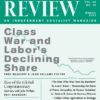Memories of the Afro-Caribbean Left
The name “Walter Rodney” has receded from public memory in the last few decades. Only yesterday, it seems to this reviewer, Rodney was the most promising young political scholar of Afro-Caribbean origin, influential from parts of Africa to Britain and North America, not to mention his home Guyana, as well as Jamaica, Trinidad, and other anglophone islands. He was revered: great things were expected of him, as great things were expected of the new phase of regional history in which independence had been achieved and masses mobilized for real change. | more…

March 2013 (Volume 64, Number 10)
The history of capitalism is replete with cases of successful captains of industry who, suddenly concerned with their place in history, decide to write a book celebrating their achievements, while articulating a new philosophy of philanthropic capitalism—usually with the help of a ghostwriter or “collaborator” of some sort.… [In this genre] is a new book, Conscious Capitalism: Liberating the Heroic Spirit of Business, written by Whole Foods Market co-CEO John Mackey in collaboration with Bentley University professor of marketing Raj Sisodia.… [I]n spite of all the references to a new form of “heroic capitalism,” which cares about employees and customers, Mackey, like most of his class, is a strong proponent of the most extreme forms of neoliberal exploitation. Both in Conscious Capitalism and in his public actions he has shown himself to be virulently anti-union, priding himself on keeping Whole Foods Market 100 percent union free, and slashing the wages of his workers even as profits have increased. | more…
Class War and Labor’s Declining Share
Given [the] background of high unemployment, lower-wage jobs, and smaller portions of the pie going to workers, it should come as no surprise that, according to the U.S. Census Bureau, nearly 50 million people in the United States live in poverty (with income in 2011 below $23,021 for a family of four) while another 50 million live between the poverty level and twice the poverty level—one paycheck away from economic disaster. Thus, the poor (those in poverty or near poverty), most of whom belong to the working poor, account for approximately 100 million people, fully one-third of the entire U.S. population.… Wage repression and high unemployment are the dominant realities of our time. A vast redistribution of income—Robin Hood in reverse—is occurring that is boosting the share of income to capital, even in a stagnating economy. Is it any wonder, then, that for years on end polls have shown a majority of the population agreeing with the statement that the United States is on the wrong track and not headed in the right direction? | more…
Ghosts
Marge Piercy is the author of eighteen poetry books, most recently The Hunger Moon: New & Selected Poems, 1980–2010 from Knopf. Her most recent novel is Sex Wars (Harper Perennial) and PM Press has republished Vida and Dance the Eagle to Sleep with new introductions. | more…
China 2013
The debates concerning the present and future of China—an “emerging” power—always leave me unconvinced. Some argue that China has chosen, once and for all, the “capitalist road” and intends even to accelerate its integration into contemporary capitalist globalization. They are quite pleased with this and hope only that this “return to normality” (capitalism being the “end of history”) is accompanied by development towards Western-style democracy (multiple parties, elections, human rights). They believe—or need to believe—in the possibility that China shall by this means “catch up” in terms of per capita income to the opulent societies of the West, even if gradually, which I do not believe is possible. The Chinese right shares this point of view. Others deplore this in the name of the values of a “betrayed socialism.” Some associate themselves with the dominant expressions of the practice of China bashing in the West. Still others—those in power in Beijing—describe the chosen path as “Chinese-style socialism,” without being more precise. However, one can discern its characteristics by reading official texts closely, particularly the Five-Year Plans, which are precise and taken quite seriously. | more…
Rise of the Global Corporatocracy: An Interview with John Perkins
Economic hit men (EHMs) are highly paid professionals who cheat countries around the globe out of trillions of dollars. They funnel money from the World Bank, the U.S. Agency for International Development (USAID), and other foreign “aid” organizations into the coffers of huge corporations and the pockets of a few wealthy families who control the planet’s natural resources. Their tools include fraudulent financial reports, rigged elections, payoffs, extortion, sex, and murder. They play a game as old as empire, but one that has taken on new and terrifying dimensions during this time of globalization. I should know; I was an EHM. —John Perkins, Confessions of an Economic Hit Man (2004) | more…
The Man Who Was Over the Rainbow
When I was a lad, I wrote amorous ditties, To Judy, Aleine, Edelina, and Sue. But now that I’m gray, I’ve abandoned those pretties, I’m singing my songs to the MONTHLY REVIEW.… So sang E.Y. “Yip” Harburg, to the tune of “The Streets of Laredo,” at Monthly Review’s fifteenth anniversary party. Accompanying him on piano was my late wife, the Judy to whom Yip wrote ditties. You will not find her or Aleine Mufson mentioned in the pages of this biography. Nor will you find cited any who, because they rubbed elbows or other body parts with Harburg, could lead the reader to the fullest possible understanding of who he was. | more…
Cuban Urban Agriculture as a Strategy for Food Sovereignty
Examining the Bases of Power, Inequality, and Human Variation
Notes on a Life in Struggle

February 2013 (Volume 64, Number 9)
For a long time now orthodox economics has been hindered by its extreme irrealism—a refusal even to attempt a realistic theoretical understanding of how modern capitalism functions. The shift to using fanciful assumptions to explore largely minor issues, following a brief Keynesian moment in the post-Second World War era, has been in many ways self-reinforcing. Once fundamental characteristics of the capitalist economy such as labor exploitation, accumulation, built-in inequality, monopoly power, rent-seeking behavior, technological change, and the tendency to stagnation were removed from the analysis—as a result of an ideological process of system-rationalization—there was little recourse but to fall back in successive stages on more and more abstract models based on increasingly purified notions of individual rationality.… Nevertheless, the deepening crisis of today’s monopoly-finance capital has given rise to a new era of questioning within the economics profession, and some top-tier neoclassical economists are now struggling—though hindered at every step by their own training and inclinations—to recapture knowledge long abandoned. | more…
James Hansen and the Climate-Change Exit Strategy
The world at present is fast approaching a climate cliff. Science tells us that an increase in global average temperature of 2°C (3.6° F) constitutes the planetary tipping point with respect to climate change, leading to irreversible changes beyond human control. A 2°C rise is sufficient to melt a significant portion of the world’s ice due to feedbacks that will hasten the melting. It will thus set the course to an ice-free world. Sea level will rise. Numerous islands will be threatened along with coastal regions throughout the globe. Extreme weather events (droughts, storms, floods) will be far more common. The paleoclimatic record shows that an increase in global average temperature of several degrees means that 50 percent or more of all species—plants and animals—will be driven to extinction. Global food crops will be negatively affected. | more…
Celia Sánchez and the Cuban Revolution
Nothing makes me more hopeful than discovering another human being to admire. My wonder at the life of Celia Sánchez, a revolutionary Cuban woman virtually unknown to Americans, has left me almost speechless. In hindsight, loving and admiring her was bound to happen, once I knew her story. Like Frida Kahlo, Zora Neale Hurston, Rosa Luxemburg, Agnes Smedley, Fannie Lou Hamer, Josephine Baker, Harriet Tubman, or Aung San Suu Kyi, Celia Sánchez was that extraordinary expression of life that can, every so often, give humanity a very good name. | more…